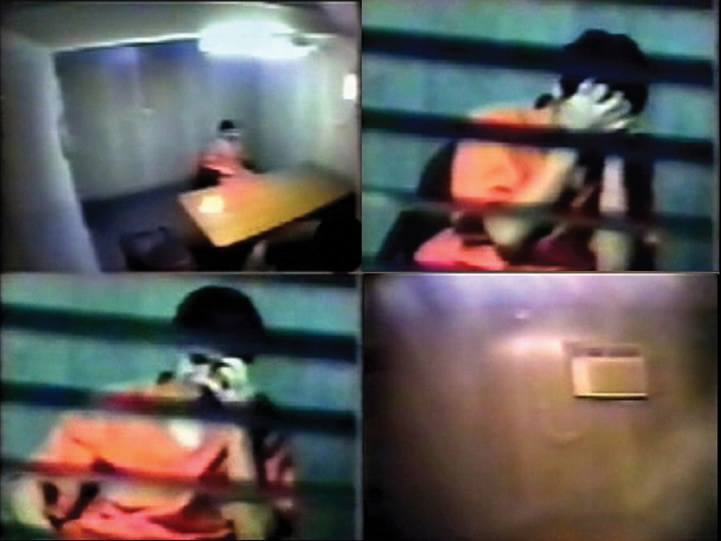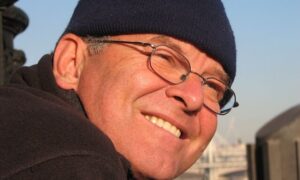A poorly recorded video starts. The door of the interrogation room opens. Behind table a young prisoner in chains and dressed in orange sits waiting. Two men and a woman enter the cell:
Man 1: How’s your English?
Omar Khadr: Good.
Man 1: It is good, eh?
Omar Khadr: Yea.
Man 1: Look, the reason we’re down here, we wanted to talk to you for a couple of days.
Omar Khadr: OK.
Man 1: Talk to you about a bunch of things.
Omar Khadr: No problem.
Man 1: You’re good with that?
Omar Khadr: Yes.
Man 1: So I guess we’re the first Canadians you’ve seen in a while?
Omar Khadr: Canadians?
Man 1: Yeah.
Omar Khadr: Finally! (laughs)
These are the first words spoken between Omar Khadr and the team from the Canadian Security Intelligence Service (CSIS) that has come to interrogate him. The atmosphere appears relaxed and Omar clearly seems to hope and believe this visit will yield positive results [for him]. He even appears confident – and why not? They treat him like a human being. They call him by his name, they offer him a sandwich. «A Subway or do you like McDonalds? Whichever one you want. A Coke?» The youngster gladly accepts, almost incredulous at this happy turn of events. Things are off to a good start.
It won’t stay that way. Omar, barely 16 years old, had already been subjected to an array of American «enhanced interrogation» techniques. Having spent the last five months in Guantánamo, he would quickly break under psychological pressure from the Canadian agents. Indeed, by the second day he had already fallen into a state of profound psychological regression.
This interrogation lasted four days between February 13th and 16th, 2003, at a US maximum security facility in Guantánamo Bay, Cuba. The entire encounter was recorded. In May, 2008, the Canadian Supreme Court ordered the Canadian government to turn over to Omar Khadr’s lawyers thousands of pages of documents related to the case. This was how seven hours of videotape entered the public domain.
Prior to turning over the video the CSIS invoked claims of «national security» to erase significant portions of the audio track. Nonetheless, the dialogue that remains and the events it reveals are riveting and dramatic.
Taking this unique document as the backbone of the documentary, the interrogation then is examined by a panel of experts including a Toronto psychiatrist who specializes in treating the victims of torture, and the US military defense lawyer representing Omar Khadr. There are also interviews with released Guantánamo prisoners who knew Omar well, and with an ex-torturer from the US detention facility at Bagram Air Base, Afghanistan.
The government of the United States accuses Omar Khadr of killing a US special forces soldier during an assault in July, 2002, in Afghanistan. Omar was then fifteen years old. As of this writing, May, 2010, he remains incarcerated awaiting trial before a military commission. He is to be the first child soldier ever charged with war crimes.
Each of the four days of interrogation possesses its own particular qualities but taken together, the chronology gives the story a structure that unfolds in four chapters.
Day 1 – Hope.
Day 2 – Fallout.
Day 3 – Blackmail.
Day 4 – Failure.
On the final day when the Canadian agents are just about to leave we hear the last words exchanged:
Omar Khadr: I want to call my grandparents.
Man 1: Well, I can’t arrange that.
Omar Khadr: You ain’t doing anything for me.
Man 1: We can’t do anything for you ?!
Omar Khadr: You didn’t do anything for me…
Man 1: We can’t do anything to you.
Man 2: We can’t do anything do you, only you can help yourself.
He gets up and put the A/C on.
Certainly, there are no artistic considerations from the original low quality video made by government agents in a prison cell. It has been our goal as filmmakers to take this same material and recontextualize it into a work of cinematic importance.
About Omar Ahmed Khadr
Canadian citizen. Born in Toronto on September 19, 1986, he was fifteen years old when he was taken prisoner by U.S. forces in Afghanistan on July 2002. Captured in battle and severely wounded he was taken to Bagram Air Force base where he was interrogated and tortured. On October 2002, he was sent to the U.S. military prison in Guantánamo Bay, Cuba. The U.S. government accuses Omar Khadr of having killed an American soldier and intends to try him as a war criminal. Omar is the last citizen of a western power being held in Guantánamo. The Canadian conservative government has refused to request his repatriation.





